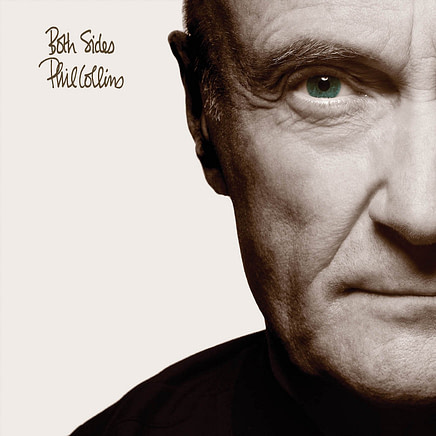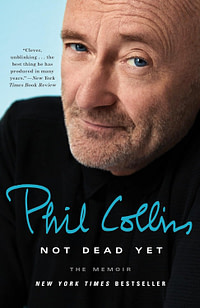Rock Theology’s purpose is to explore religious and theological themes in the music of secular artists. Here, we will explore religious and theological themes in Phil Collins’ song “Can’t Find My Way.”
Few artists have carved as profound and enduring a mark on the landscape of popular music as Phil Collins. Known for his emotive voice, evocative songwriting, and percussive genius, Collins has consistently invited listeners into the depths of human experience—love, loss, hope, and the search for meaning. In his song “Can’t Find My Way,” Collins explores themes of spiritual longing, existential uncertainty, and the struggle for redemption, all of which carry significant religious and theological undertones. This post explores these themes in detail, framed by a biographical overview of Collins and an examination of the song’s origins and album context.
If you would prefer to watch the video version of this Rock Theology click the button below:
Phil Collins: A Brief Biography
Philip David Charles Collins was born on January 30, 1951, in London, England. His introduction to music began early, with a toy drum kit at the age of five. This childhood fascination blossomed into a lifelong passion, leading him to pursue a career in professional drumming and, eventually, a multifaceted career as a musician, singer-songwriter, and producer.
Collins first gained widespread recognition as the drummer and later the lead vocalist for the progressive rock band Genesis. His distinct drumming style and rich, emotive vocals helped the band evolve from its complex, theatrical roots into a chart-topping pop-rock powerhouse. As a solo artist, Collins achieved massive success with a string of hit albums and singles throughout the 1980s and 1990s, cementing his place as one of the most influential musicians of his generation.
Collins’ solo work is marked by introspective lyrics, pop sensibility, and an uncanny ability to connect deeply with listeners’ struggles. His songs often grapple with emotional pain, broken relationships, and the search for hope amidst despair. This background provides a fertile ground for examining the spiritual dimensions of “Can’t Find My Way.”
Background of “Can’t Find My Way” and Both Sides
“Can’t Find My Way” appears on Phil Collins’ 1993 album, Both Sides. This album stands out in Collins’ discography for its deep personal content and its distinctive production approach. Collins wrote, performed, and produced every track on the album. It is often mistakenly said that he played all the instruments. Well, that is almost true. However, the guitars were computer-generated from his keyboard input. Nevertheless, this hands-on approach to the album yielded an intimate collection of songs that reflected the tumultuous period in his personal life at the time, including the breakdown of his second marriage.
Both Sides is often described as Collins’ most introspective and confessional album. Eschewing the glossy pop production of his earlier work, the album embraces a more subdued, almost raw sound. “Can’t Find My Way” sits perfectly within this context: a song suffused with yearning, vulnerability, and a sense of searching for something just out of reach.
Two lines in the song can be used to argue that the song has no religious or theological meaning.
Oh, just to sit a while
Oh, just to sit and watch you smile
On this level, the song is clearly about the loss of his second wife due to divorce. It’s about his longing to get back to what they once had and their inability to find their way back. One has to think that is what Collins had in mind when he wrote the song. However, the entire rest of the song's lyrics are theological, and so, intentional or not, we must also be able to interpret the song on another level. And that is what we will do in the rest of this post.
Lyrical Analysis:
Spiritual Longing and Theological Themes
At the heart of “Can’t Find My Way” is a narrative of being lost and searching. The song’s repeated refrain—“I can’t find my way”—serves as both a literal statement of confusion and a metaphorical expression of spiritual uncertainty. This is the presence of alienation. The song’s verses are suffused with a sense of estrangement, not only from others but from oneself.
But this also echoes the confessional traditions found in the Psalms and other sacred texts, in which the speaker lays bare their soul before God, admitting their lostness and dependence on a higher power. This motif resonates with biblical and theological traditions of exile, wandering, and the pursuit of divine guidance.
The song also has a journey motif:
Tired and weary, I follow the path
That leads to your door
But it occurred to me, all that I have
Is already yours
The concept of “finding one’s way” is a longstanding one in religious literature. Scriptural figures, such as Moses, the Israelites, and even Jesus himself, are depicted as journeying through wildernesses—both literal and spiritual. In “Can’t Find My Way,” Collins taps into this archetype, positioning himself as a modern-day wanderer seeking direction but with a recognition that “all that I have is already yours.”
Collin’s song also expresses a yearning for redemption:
Keep the faith you say
To keep the faith I pray
Well be strong you say
Just follow the light
The lyrics suggest a longing not merely for geographical or relational clarity, but for redemption—release from inner turmoil and the restoration of meaning. This reflects a theological understanding of salvation as the process of being “found,” of being led from darkness to light.
Imagery of Darkness and Light
Religious traditions often use darkness and light as symbols for ignorance and enlightenment, sin and salvation, despair and hope. Collins’ “I can’t find my way”—emphasizes the obscurity and silence that can settle over the soul in moments of crisis. The longing for light, for clarity, is palpable, mirroring the biblical plea: “Your word is a lamp to my feet and a light to my path” (Psalm 119:105). And Collins’ lyrics say, “Just follow the light.”
The Role of Silence and Prayer
A notable feature of “Can’t Find My Way” is its subdued, almost prayerful tone. The sparse instrumentation and plaintive delivery evoke the act of prayer—reaching out in hope, even when no answers seem forthcoming. This resonates with the experiences of many believers who, in moments of spiritual desolation, find themselves voicing prayers that seem to go unheard. Collins’ song gives voice to this struggle, articulating the tension between faith and doubt.
Brokenness and Grace
The song’s emotional core is one of brokenness—a recognition of human frailty and the limits of self-sufficiency. Yet, embedded within the lament is the implicit hope that grace—understood theologically as unmerited favor or divine assistance—might intervene. The repeated admissions of inability (“I can’t find...”) recall the biblical beatitude: “Blessed are the poor in spirit, for theirs is the kingdom of heaven” (Matthew 5:3). In acknowledging his brokenness, the narrator opens himself to the possibility of transformation.
Theological Resonances:
Universal Spiritual Questions
While “Can’t Find My Way” is not overtly religious in its language, its themes are deeply theological. The song grapples with universal questions that lie at the heart of spiritual inquiry:
- Where do we turn when we are lost?
- Is there a source of meaning or guidance beyond ourselves?
- Can brokenness lead to healing and redemption?
- How do we live with uncertainty and unanswered questions?
Collins does not offer easy answers. Instead, he invites listeners to dwell in the ambiguity, to embrace the vulnerability inherent in the human condition. This openness to mystery is itself a theological stance—one that values authenticity over certainty, process over arrival.
Religious Parallels and Philosophical Echoes
The song’s themes resonate not only within Christian traditions but across religious and philosophical boundaries. The Buddhist concept of “dukkha”—the pervasive sense of unsatisfactoriness and longing—is reflected in the song’s mood. Similarly, the Jewish tradition of wrestling with God (as in the story of Jacob) finds a parallel in Collins’ willingness to grapple with doubt and despair.
Even outside explicitly religious frameworks, “Can’t Find My Way” speaks to the existential longing that defines the human experience. The song acknowledges the limits of reason and the necessity of faith, not necessarily faith in a doctrinal sense, but faith as trust, as the hope that meaning can be found even when “the way” is obscured.
The Song in Context:
Personal and Collective Resonance
Given the album’s confessional nature, it is tempting to read “Can’t Find My Way” as an autobiographical reflection on Collins’ struggles with relationships, fame, and inner demons. Yet the song transcends the specifics of his life, speaking to anyone who has ever felt adrift or uncertain.
In a broader sense, the song functions as a prayer for the modern world—a world in which traditional sources of meaning are often questioned or rejected. Yet, the longing for guidance and connection remains undiminished. The song’s enduring appeal lies in its honesty: rather than offering platitudes, it sits with the pain and the hope, the confusion and the yearning.
Conclusion
“Can’t Find My Way” is a testament to Phil Collins’ ability to articulate the complexities of the human spirit. Through its evocative lyrics and restrained musical setting, the song gives voice to the search for meaning in a world often marked by loss and uncertainty. Its religious and theological themes—journey, longing, confession, hope—invite listeners to reflect on their own lives and, perhaps, to find comfort in the collective experience of seeking.
Collins’ legacy as an artist rests not only on his technical prowess and commercial success but on his willingness to be vulnerable and authentic. In “Can’t Find My Way,” he offers a modern psalm for the spiritually restless, reminding us that the journey itself—though fraught with questions—remains a sacred one.
You can listen to the song on YouTube. You can check out the song's full lyrics at AZlyrics and see if other parts of the lyrics intrigue you. Please use the comments section below to discuss my thoughts or what you discover in the lyrics. Keep the rock theology discussion going!
Previous Rock Theology Posts:
"When The Music's Not Forgotten" by Deadman.
"(God) Advice To A Friend" by Ian Hunter.








I read and enjoyed, Joel. Thank you sharing this. It encourages me to explore song lyrics as Collins’ more deeply and from other perspectives, especially spiritually. I have been thinking for a while about sharing lyrics (and the music) to contemorary Christian songs with people who are wanting to reflect on how they speak to them and the meaning that comes from it through writing/creativity workshops. Just haven’t pursued this seriously. Your writing here is an excellent example of how powerful this can be.
Thank you. I think things like music (or literature) often have a greater impact than the best-constructed arguments.